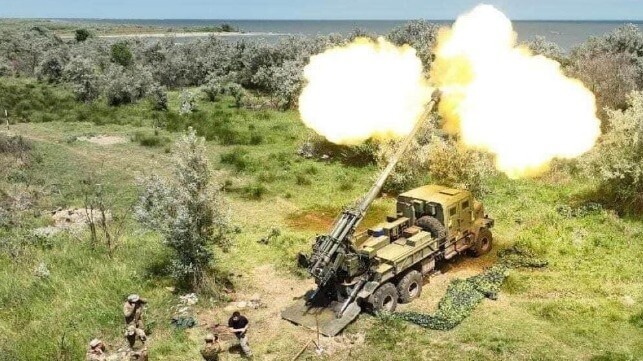Ukraine Ejects Russian Forces From Snake Island
Russian Ministry of Defense confirms "completion of assigned tasks" and withdrawal from the island

Ukrainian artillery strikes and aerial bombardment have successfully expelled Russian forces from Snake Island, a small but strategic rock outcropping off the nation's southern coastline. The island was seized by the Russian Navy on the opening day of the invasion, and the last stand of the defenders quickly became a symbol of Ukrainian resistance.
The island is located just 20 nm off the coast of the Ukrainian-Romanian border, within reach of extended-range 155mm artillery shells and the U.S.-provided HIMARS rocket launcher. Ukrainian ground-attack aircraft and drones also played a role, according to open-source intelligence and official Ukrainian sources. The island's 45-acre expanse is exposed and difficult to defend, according to analysts Michael Kofman and Dmitry Alperovich, who predicted its clearance in advance. In addition, Ukraine repeatedly struck Russian resupply vessels as they attempted to bring equipment and personnel to the island.
Even though Russian forces packed the island with advanced air defense systems, aerial surveillance and satellite imagery shows that Ukrainian ordnance got through. Analysts do not expect Ukraine to reoccupy the island in any militarily-significant way, given its proven vulnerability, and Ukraine's southern operational command has stated that this is not yet the time to return.
Another strike of the #UAarmy on the russian troops on Snake Island. The occupiers lost an anti-aircraft system Pantsir (SA-22 Greyhound). The cleaning of our land will continue as long as needed. pic.twitter.com/WpXbUrOICH
— Defence of Ukraine (@DefenceU) June 27, 2022
#Ukraine: As Russians rapidly withdraw from the famous Snake Island, the Ukrainian army shows how they regularly targeted it- here we see a Ukrainian-developed Bohdana 155mm self-propelled howitzer destroying Russian positions on the island with fire correction from a TB2 drone. pic.twitter.com/oUq6AUSiQi
— ???????? Ukraine Weapons Tracker (@UAWeapons) June 30, 2022
New satellite imagery taken this morning shows smoke coming from the contested Snake Island (45.255721, 30.204173) which Russia announced its withdrawal from today: https://t.co/zeXogu20Bt. ???? @Maxar pic.twitter.com/OyWc3Shf0n
— Benjamin Strick (@BenDoBrown) June 30, 2022
Ukrainian and Russian officials confirmed the departure of the last Russian troops from Snake Island on Thursday. In a statement, Russian Ministry of Defense spokesman Lt. Gen. Igor Konashenkov claimed that Russia's armed forces "completed the fulfillment of the assigned tasks on the island" and have withdrawn as a "step of goodwill."
The voluntary Russian withdrawal after sustained bombardment "demonstrated to the world community that the Russian Federation does not interfere with the efforts of the UN to organize a humanitarian corridor" for Ukrainian grain, Konashenkov claimed.
However, Russia has tacitly acknowledged its blockade by offering to provide the "necessary humanitarian passage" for merchant ships - in exchange for sanctions relief from western nations. Meanwhile, the removal of Ukraine's food exports from the global market has created a supply crisis in import-dependent nations in the Middle East and Africa, raising risk of famine in nations that have no direct stake in the war.
This food shortage may align with Russian policy objectives, according to top government public-relations representative Margarita Simonyan, head of state network RT. At an economic forum earlier this month, Simonyan suggested that the confidants in her circle "hope for a famine" in order to apply pressure on the West and secure sanctions relief.
Margarita #Simonyan, editor-in-chief of RT, says frankly that she hopes for a famine. By organizing it, they hope to force the West to become friends with #Russia. pic.twitter.com/zRYmGFeKhv
— NEXTA (@nexta_tv) June 21, 2022
While the attack on Snake Island denies Russia a platform for its blockade, it is not enough to secure the sea lane in itself. The Russian Navy still has a wide range of resources to draw on if it wishes to launch future attacks on merchant shipping. These include half a dozen Kilo-class attack subs; five frigates; long range anti-ship missile batteries in Crimea; air-launched anti-ship missiles; and (according to U.S. intelligence) a Russian campaign of mining key Ukrainian waterways.
 Stay on Top of the Daily Maritime News The maritime news
Stay on Top of the Daily Maritime News The maritime news
that matters mostGet the latest maritime news delivered to your inbox daily.
Also the Blockade is enforced by warships (and potentially submarines if it came to it). We have observed them operating south of Snake Island pic.twitter.com/7wJ6PFrIkx
— H I Sutton (@CovertShores) June 30, 2022
While Odesa remains under blockade, shipments of Ukrainian grain (potentially stolen) have resumed from the Russian-occupied port of Berdyansk, according to Russian-appointed regional administrator Evgeny Balitsky.
